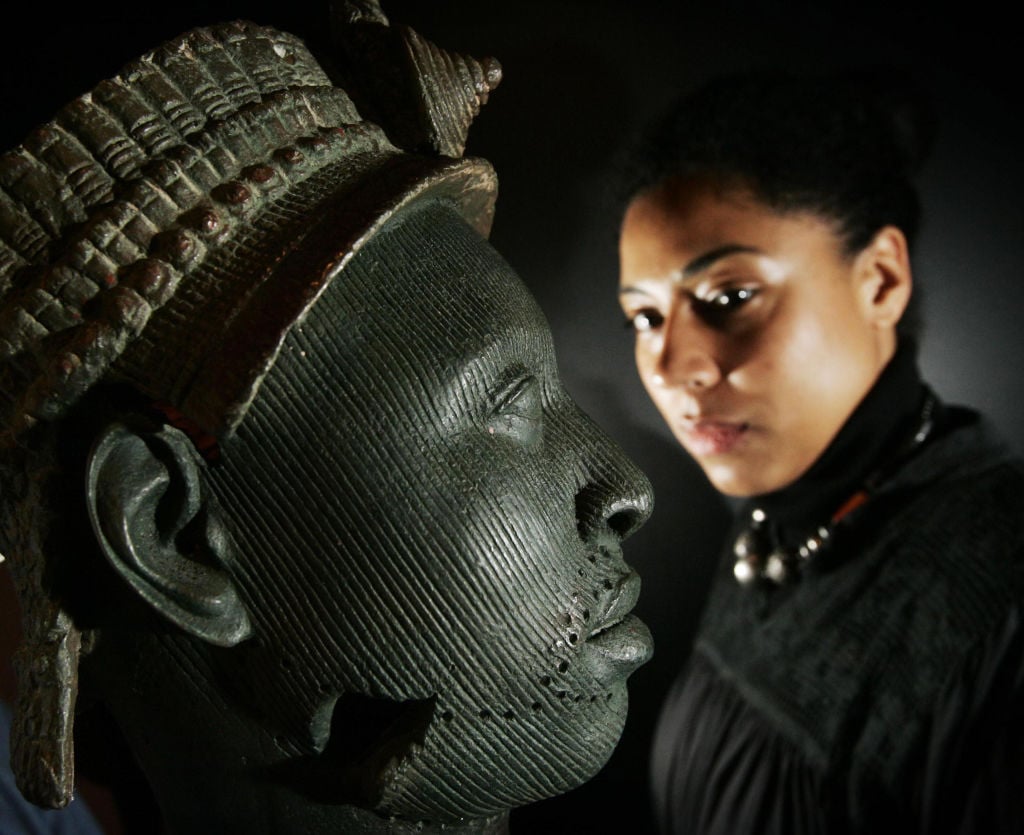
Isaiah Ogundele, a 34-year-old man facing charges related to a protest action he staged in front of colonial artifacts at a London Museum in January, failed to appear for his court date last week. A representative for the Metropolitan Police told Artnet News that they are currently trying to track him down.
Ogundele has been charged with using “threatening, abusive, insulting words, or behavior with intent to cause harassment, alarm, or distress,” according to the Crown Prosecution Service. He was convicted in absentia at the September 18 hearing, the Crown Prosecution Service said.
The inciting incident occurred when Ogundele was visiting the Museum of London Docklands’s exhibit “London, Sugar, & Slavery,” dedicated to the city’s involvement in the transatlantic slave trade. Angered by the content—which included, according to a statement from the museum, a selection of Benin Bronzes and other Ife replica pieces on loan from the British Museum—he reportedly charged the display and toppled the sculptures from their plinths in an attempt to seize them. The Telegraph reported that he said he was “not over slavery” and sought to return the objects to their rightful home. The objects have since been removed from view, according to the museum.
The precious bronze plaques and sculptures, which are held in many museums in Europe and around the world, were pillaged by the British navy during an attack on the royal palace in Benin City, Nigeria, in 1897. Calls for their return have been growing amid increased pressure for European nations to address their colonial pasts.
Ogundele is not the only person to take dramatic and direct action inside a European institution this year to protest the presence of African cultural heritage. Congolese activist Mwazulu Diyabanza is facing trial next week in Paris for a widely publicized action he led at the Musée du quai Branly in June, when he removed a funerary object of colonial-era origin, saying the museum was not its rightful owner. He carried out two similar actions in Marseille and in the Netherlands this year.
Reached by Artnet News, Diyabanza—who sees his acts as part of a broader push for reparations for cultural expropriation—expressed his “support and solidarity with the target.”
“It is a disgrace to the supposedly democratic monarchy of Great Britain to condemn someone for peacefully expressing their opinions,” Diyabanza said. “The British judiciary has just rallied without any resistance behind the injunctions of an oligarchy that refuses to see Africa gain access to its cultural heritage and priceless heritage.I redouble my efforts to win the September 30th trial for the restoration of the historical truth and the restitution of our heritage.”
All the works targeted by Ogundele were on long-term loan from the British Museum. On view were two replicas cast of the head of an Ife man dating to the 14th century; the cast of the head of an Ife King (dating to between 1100–1300), as well as an original Benin water container from the 1500s and a Benin brass plaque from the 1500s.
According to the Telegraph, museum manager Henry Martin recounted that Ogundele “said the object had been stolen from his heritage” and that the pieces “had been stolen and he wanted to take them back.”
Artnet News was not able to reach Ogundele for comment.
Update, September 24: The Crown Prosecution has corrected its earlier statement in which it said Ogundele was not convicted in absentia. He has, the body now tells Artnet News. The article has been updated accordingly.